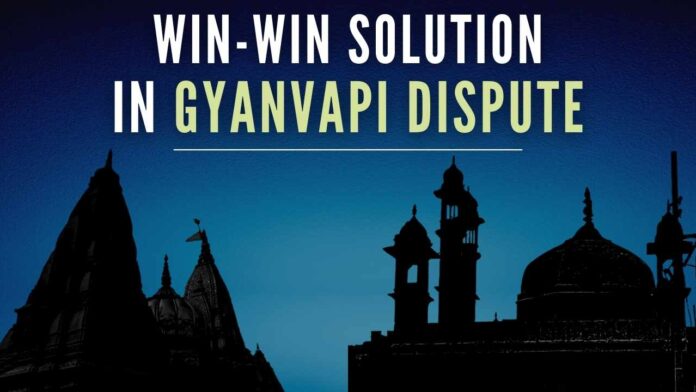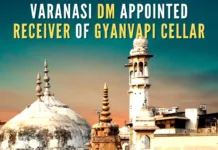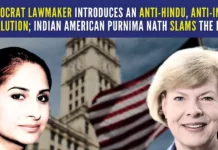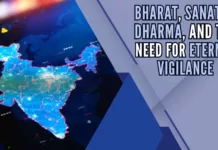
‘Win-win’, or at least ‘no lose’ solution
The row over Gyanvapi Masjid-Temple is too current and well known to necessitate going into details. The purpose of this article is to see if a ‘win-win’ solution, or at least a ‘no-lose, no-lose solution, is possible.
The need for such a resolution is obvious. We all share the same nation. Hindus and Muslims can’t be fighting each other eternally, which is a strong possibility the way things are headed.
There are a large number of Hindus (mostly people supporting opposition political parties, liberals, non-believers, left leaners, et al) who support the Muslim side. There are also a significant number of Muslims (many who may not come out openly) who support the Hindu side. But for want of a better term, let me call the 2 sides the Hindu side and the Muslim side.
The solutions proposed in almost all the debates, in print, on TV, and on social media, and in private circles, favour one side or the other, which are not acceptable to the opposite side.
The dispute is in the courts, and at some point in time, the courts may give their verdicts which would be escalated to higher courts, till final resolution. In the meantime, the religious and political temperature in the country will remain very high.
We are a noisy democracy. It is good in a way despite the noise, because every issue is resolved through a reasonably fair and well-accepted process, even if there is disagreement on the final resolution by a small percentage of the people, and thus we continue to remain a vibrant democracy.
What is not so good about it is, the price we are paying in the form of polarization, pulling in different directions, etc, which leads to a certain level of inefficiency in our national functioning and bad taste in the mouth of many.
If there is an amicable resolution to the Gyanvapi dispute (and similar other disputes) through a negotiated settlement process, there will be less polarization, our nation will move forward stronger, and we will add a few more points to our GDP, and there will be more peace all around.
Sure enough, both sides would not want to be the loser in such a settlement and will find it difficult to sell any settlement (which is not 100% win to their side) to their supporters. It is a legacy problem where neither side is the primary cause of the problem.
We should aim for a ‘win-win’ solution, or at least ‘no lose’ for both sides. This is not going to be easy. Even if either or both sides are mentally ready for a settlement, they would both find it difficult to make the first move, in order not to come across as the weaker side.
Here is where responsible leadership from both sides can come forward, and try to talk to each other and to both the sides in an atmosphere of cordiality, even if the two sides completely disagree with each other, to start with.
Supreme Court, in all its sincerity, tried to form a Mediation Panel in the Ayodhya case, but unfortunately, both sides were unwilling to listen to the panel and wanted SC to give its judgment. In this case, also, SC will be very happy if mediation is attempted.
When SC gives a judgment purely legally, one of the two sides could end up losing. Though both sides may believe they have the stronger case, such cases are likely to take many twists and turns, and the final judgment can’t be easily guessed.
If mediators on both sides think creatively, with the assistance of professional mediators, I’m sure confident a settlement is possible.
Just to illustrate that such a middle ground solution is possible, let me present one herein, without meaning to offer this as the final solution, only to demonstrate that such creative solutions are possible.
Though this is not yet a title suite, with the finding of what Hindus believe to be the Shivling and other broken idols/ symbols, this will soon evolve into one, directly or indirectly.
The title of the entire mosque land can remain with the Muslim side. A piece of land of importance for the Hindus within the mosque area can be identified (e.g., the areas containing the Shringar Gauri, Shivling, etc), which could be perpetually (eternally) rented out to the Hindu side, with the Hindu side having to compensate the Muslim side every month for all the time to come, with some upfront payment to the Muslim side to help them rebuild extension to the mosque they may have to rebuild in lieu of the space they would be renting out.
This will give the specific space Hindus would want for their extended temple, though they may not own the land and consequently keep paying rent for the land eternally.
Since Muslims would own the title and consequently receive rent eternally, and have at least as large a mosque as they now have or even larger, they wouldn’t have lost their space. Such a resolution would also present them in an accommodative/ magnanimous light.
A longstanding nationally important dispute would have been resolved amicably. The entire world would admire the sagacity of both sides.
This dispute would cease to have political repercussions, which should be in the interest of every well-meaning citizen.
Once this case is resolved, both sides will be in a better frame of mind to resolve all other outstanding issues also on a mutually accommodative basis through similar mediation.
Note:
1. Text in Blue points to additional data on the topic.
2. The views expressed here are those of the author and do not necessarily represent or reflect the views of PGurus.
PGurus is now on Telegram. Click here to join our channel and stay updated with all the latest news and views
For all the latest updates, download PGurus App.
- How China can manage its Covid situation today - December 22, 2022
- BJP’s dilemma: Winnability or right candidates? - December 15, 2022
- Strong and credible challenger to Modi - December 13, 2022











Ridiculous – aurangzeb invaded the place, destroyed the temple constructed the mosques – this is on record – islam has no place in kasi – government can take over the mosque area to expand kasi visweswara dhamki. If muslims plead, government can give sone kand for them outside kasi – at least 10 km away from the kasi viswanath corridor